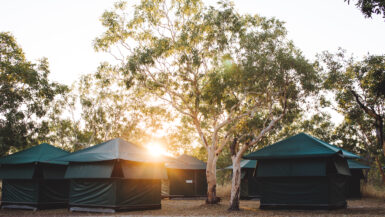Camping is a great way to connect with nature and explore the beauty of the world around us. However, the impact of traditional camping on the environment and wildlife can be significant. Fortunately, there are many eco-friendly camping sites in Oceania that offer a sustainable and responsible way to enjoy the great outdoors. From pristine beaches to lush rainforests, these camping sites are designed to minimize their impact on the environment while providing a comfortable and enjoyable experience for campers. In this article, we will explore some of the best eco-friendly camping sites in Oceania, so you can plan your next adventure with sustainability in mind.
Introduction to Eco-Friendly Camping and Its Benefits
Camping is a great way to connect with nature, relax and unwind from the hustle and bustle of city life. However, traditional camping practices can have a negative impact on the environment. That’s where eco-friendly camping comes in. Eco-friendly camping is all about reducing your impact on the environment while still enjoying the great outdoors.
Eco-friendly camping is becoming increasingly popular, and for good reason. It allows campers to enjoy the outdoors while also protecting the environment. By using sustainable camping practices, you can help reduce waste, conserve resources, and preserve the natural beauty of the camping site.
There are many benefits to eco-friendly camping. First and foremost, it helps to protect the environment. By reducing your impact on the environment, you are helping to preserve the natural beauty of the camping site for future generations to enjoy.
Eco-friendly camping can also save you money. By using reusable products and reducing waste, you can save money on camping supplies and reduce the need for expensive cleanup services.
Finally, eco-friendly camping can also be a more enjoyable experience. By connecting with nature and practicing sustainable camping practices, you can have a more meaningful and fulfilling camping experience.
In the following sections, we will explore some of the best eco-friendly camping sites in Oceania, as well as sustainable camping practices to follow while camping. We will also provide tips for planning an eco-friendly camping trip in Oceania.
Top Eco-Friendly Camping Sites in Australia
Australia is home to some of the most beautiful and diverse landscapes in the world, making it the perfect destination for eco-friendly camping. Here are some of the top eco-friendly camping sites in Australia:
1. Freycinet National Park, Tasmania
Freycinet National Park is located on the east coast of Tasmania and boasts stunning granite mountains, white sandy beaches, and crystal-clear waters. The park offers a range of eco-friendly camping options, including powered and unpowered sites, as well as cabins and glamping tents. The park is committed to sustainability and encourages visitors to practice responsible camping by using reusable products, conserving water, and reducing waste.
2. Wilsons Promontory National Park, Victoria
Wilsons Promontory National Park is located at the southernmost tip of mainland Australia and is home to some of the most beautiful coastal scenery in the country. The park offers a range of eco-friendly camping options, including powered and unpowered sites, as well as cabins and glamping tents. The park is committed to sustainability and encourages visitors to practice responsible camping by using reusable products, conserving water, and reducing waste.
3. Daintree National Park, Queensland
Daintree National Park is located in Far North Queensland and is home to some of the oldest rainforests in the world. The park offers a range of eco-friendly camping options, including powered and unpowered sites, as well as cabins and glamping tents. The park is committed to sustainability and encourages visitors to practice responsible camping by using reusable products, conserving water, and reducing waste.
4. Uluru-Kata Tjuta National Park, Northern Territory
Uluru-Kata Tjuta National Park is located in the heart of Australia’s Red Centre and is home to the iconic Uluru rock formation. The park offers a range of eco-friendly camping options, including powered and unpowered sites, as well as cabins and glamping tents. The park is committed to sustainability and encourages visitors to practice responsible camping by using reusable products, conserving water, and reducing waste.
5. Cape Range National Park, Western Australia
Cape Range National Park is located on the coast of Western Australia and is home to some of the most beautiful beaches and coral reefs in the country. The park offers a range of eco-friendly camping options, including powered and unpowered sites, as well as cabins and glamping tents. The park is committed to sustainability and encourages visitors to practice responsible camping by using reusable products, conserving water, and reducing waste.
These are just a few of the top eco-friendly camping sites in Australia. Each of these sites offers a unique and unforgettable camping experience, while also promoting sustainable camping practices.
Top Eco-Friendly Camping Sites in New Zealand
New Zealand is a nature lover’s paradise, with stunning landscapes and unique flora and fauna. Here are some of the top eco-friendly camping sites in New Zealand:
1. Abel Tasman National Park
Abel Tasman National Park is located at the northern tip of New Zealand’s South Island and is known for its golden sand beaches and crystal-clear waters. The park offers a range of eco-friendly camping options, including powered and unpowered sites, as well as cabins and glamping tents. The park is committed to sustainability and encourages visitors to practice responsible camping by using reusable products, conserving water, and reducing waste.
2. Tongariro National Park
Tongariro National Park is located in the central North Island and is home to three active volcanoes. The park offers a range of eco-friendly camping options, including powered and unpowered sites, as well as cabins and glamping tents. The park is committed to sustainability and encourages visitors to practice responsible camping by using reusable products, conserving water, and reducing waste.
3. Mount Aspiring National Park
Mount Aspiring National Park is located in the Southern Alps of the South Island and is known for its rugged mountains and glaciers. The park offers a range of eco-friendly camping options, including powered and unpowered sites, as well as cabins and glamping tents. The park is committed to sustainability and encourages visitors to practice responsible camping by using reusable products, conserving water, and reducing waste.
4. Fiordland National Park
Fiordland National Park is located in the southwest of the South Island and is known for its stunning fjords and rainforests. The park offers a range of eco-friendly camping options, including powered and unpowered sites, as well as cabins and glamping tents. The park is committed to sustainability and encourages visitors to practice responsible camping by using reusable products, conserving water, and reducing waste.
5. Mount Cook National Park
Mount Cook National Park is located in the central South Island and is home to New Zealand’s highest peak, Aoraki/Mount Cook. The park offers a range of eco-friendly camping options, including powered and unpowered sites, as well as cabins and glamping tents. The park is committed to sustainability and encourages visitors to practice responsible camping by using reusable products, conserving water, and reducing waste.
These are just a few of the top eco-friendly camping sites in New Zealand. Each of these sites offers a unique and unforgettable camping experience, while also promoting sustainable camping practices.
Top Eco-Friendly Camping Sites in Fiji
Fiji is a tropical paradise with crystal-clear waters, white sandy beaches, and lush rainforests. Here are some of the top eco-friendly camping sites in Fiji:
1. Naikorokoro Beach
Naikorokoro Beach is located on the island of Viti Levu and is known for its stunning coral reefs and turquoise waters. The beach offers eco-friendly camping options, including tents and bures (traditional Fijian huts). The site is committed to sustainability and encourages visitors to practice responsible camping by using reusable products, conserving water, and reducing waste.
2. Korovou Eco-Tour Resort
Korovou Eco-Tour Resort is located on the island of Naviti and offers a range of eco-friendly camping options, including tents and bures. The resort is committed to sustainability and encourages visitors to practice responsible camping by using reusable products, conserving water, and reducing waste. The resort also offers eco-tours and activities, such as snorkeling and hiking, that allow visitors to experience the natural beauty of Fiji while also learning about the importance of conservation.
3. Yadua Island
Yadua Island is located off the coast of Vanua Levu and is known for its pristine beaches and coral reefs. The island offers eco-friendly camping options, including tents and bures. The site is committed to sustainability and encourages visitors to practice responsible camping by using reusable products, conserving water, and reducing waste. The island also offers eco-tours and activities, such as snorkeling and kayaking, that allow visitors to experience the natural beauty of Fiji while also learning about the importance of conservation.
4. Nananu-i-Ra Island
Nananu-i-Ra Island is located off the coast of Viti Levu and is known for its stunning beaches and clear waters. The island offers eco-friendly camping options, including tents and bures. The site is committed to sustainability and encourages visitors to practice responsible camping by using reusable products, conserving water, and reducing waste. The island also offers eco-tours and activities, such as hiking and fishing, that allow visitors to experience the natural beauty of Fiji while also learning about the importance of conservation.
5. Taveuni Island
Taveuni Island is known as the “Garden Island” of Fiji and is home to some of the most diverse flora and fauna in the country. The island offers eco-friendly camping options, including tents and bures. The site is committed to sustainability and encourages visitors to practice responsible camping by using reusable products, conserving water, and reducing waste. The island also offers eco-tours and activities, such as birdwatching and waterfall hikes, that allow visitors to experience the natural beauty of Fiji while also learning about the importance of conservation.
These are just a few of the top eco-friendly camping sites in Fiji. Each of these sites offers a unique and unforgettable camping experience, while also promoting sustainable camping practices.
Top Eco-Friendly Camping Sites in Papua New Guinea
Papua New Guinea is a country known for its rich culture and diverse landscapes, including rainforests, beaches, and coral reefs. Here are some of the top eco-friendly camping sites in Papua New Guinea:
1. Tufi Dive Resort
Tufi Dive Resort is located in Oro Province and offers a range of eco-friendly camping options, including tents and bungalows. The resort is committed to sustainability and encourages visitors to practice responsible camping by using reusable products, conserving water, and reducing waste. The resort also offers eco-tours and activities, such as snorkeling and diving, that allow visitors to experience the natural beauty of Papua New Guinea while also learning about the importance of conservation.
2. Buna Beach Eco Resort
Buna Beach Eco Resort is located in Oro Province and offers eco-friendly camping options, including tents and bungalows. The resort is committed to sustainability and encourages visitors to practice responsible camping by using reusable products, conserving water, and reducing waste. The resort also offers eco-tours and activities, such as kayaking and birdwatching, that allow visitors to experience the natural beauty of Papua New Guinea while also learning about the importance of conservation.
3. Tawali Resort
Tawali Resort is located in Milne Bay Province and offers eco-friendly camping options, including tents and bungalows. The resort is committed to sustainability and encourages visitors to practice responsible camping by using reusable products, conserving water, and reducing waste. The resort also offers eco-tours and activities, such as snorkeling and hiking, that allow visitors to experience the natural beauty of Papua New Guinea while also learning about the importance of conservation.
4. Lissenung Island Resort
Lissenung Island Resort is located off the coast of New Ireland Province and offers eco-friendly camping options, including tents and bungalows. The resort is committed to sustainability and encourages visitors to practice responsible camping by using reusable products, conserving water, and reducing waste. The resort also offers eco-tours and activities, such as diving and fishing, that allow visitors to experience the natural beauty of Papua New Guinea while also learning about the importance of conservation.
5. Ambunti Lodge
Ambunti Lodge is located in East Sepik Province and offers eco-friendly camping options, including tents and bungalows. The lodge is committed to sustainability and encourages visitors to practice responsible camping by using reusable products, conserving water, and reducing waste. The lodge also offers eco-tours and activities, such as cultural tours and birdwatching, that allow visitors to experience the natural beauty and rich culture of Papua New Guinea while also learning about the importance of conservation.
These are just a few of the top eco-friendly camping sites in Papua New Guinea. Each of these sites offers a unique and unforgettable camping experience, while also promoting sustainable camping practices.
Top Eco-Friendly Camping Sites in Vanuatu
Vanuatu, an archipelago of 83 islands in the South Pacific, is a perfect destination for eco-friendly camping. With its pristine beaches, lush rainforests, and crystal-clear waters, Vanuatu offers a unique and unforgettable camping experience. Here are some of the top eco-friendly camping sites in Vanuatu:
1. Ratua Private Island
Ratua Private Island is an eco-friendly resort located on a private island in Vanuatu. The resort offers luxurious tents with private bathrooms, outdoor showers, and stunning ocean views. The tents are made of natural materials and are powered by solar energy. The resort also features a restaurant that serves organic, locally sourced food and a spa that offers natural treatments.
2. Tanna Eco-Adventure Camp
Tanna Eco-Adventure Camp is located on the island of Tanna and offers a unique camping experience in the middle of a tropical rainforest. The camp features eco-friendly bungalows made of local materials, solar-powered lighting, and composting toilets. The camp also offers guided tours to the nearby Mount Yasur volcano, hot springs, and waterfalls.
3. Port Vila Holiday Park
Port Vila Holiday Park is located on the island of Efate and offers a range of eco-friendly camping options, including tent sites, caravan sites, and cabins. The park features solar-powered lighting, recycling facilities, and rainwater harvesting. The park also offers a range of activities, including kayaking, snorkeling, and hiking.
4. Eton Beach Eco-Lodge
Eton Beach Eco-Lodge is located on the island of Efate and offers eco-friendly bungalows with ocean views. The lodge features solar-powered lighting, composting toilets, and a restaurant that serves organic, locally sourced food. The lodge also offers a range of activities, including kayaking, snorkeling, and cultural tours.
5. White Grass Ocean Resort
White Grass Ocean Resort is located on the island of Tanna and offers eco-friendly bungalows with ocean views. The resort features solar-powered lighting, composting toilets, and a restaurant that serves organic, locally sourced food. The resort also offers a range of activities, including snorkeling, diving, and cultural tours.
Overall, Vanuatu offers a range of eco-friendly camping options for travelers who want to enjoy the beauty of the South Pacific while minimizing their impact on the environment. By choosing one of these eco-friendly camping sites and following sustainable camping practices, you can help to protect the natural beauty of Vanuatu for future generations to enjoy.
Sustainable Camping Practices to Follow While Camping
Eco-friendly camping is all about minimizing your impact on the environment while enjoying the natural beauty of Oceania. Here are some sustainable camping practices that you can follow to make your camping trip more eco-friendly:
1. Leave No Trace
The Leave No Trace principle is all about leaving your campsite in the same condition as you found it. Make sure to pack out all of your trash, including food scraps and cigarette butts. Don’t disturb the natural environment by moving rocks or plants, and avoid using soap or other personal care products in natural water sources.
2. Use Eco-Friendly Products
When packing for your camping trip, choose eco-friendly products whenever possible. Use biodegradable soap and shampoo, reusable water bottles and utensils, and cloth napkins instead of disposable ones. Avoid single-use plastics like straws and plastic bags, and bring a reusable shopping bag for any supplies that you need to buy.
3. Conserve Water and Energy
Water and energy are precious resources in Oceania, so make sure to conserve them while camping. Take short showers, turn off lights and electronics when not in use, and use a camp stove instead of an open fire to cook your meals. Don’t waste water by leaving the tap running while brushing your teeth or washing dishes.
4. Respect Wildlife
Oceania is home to a wide variety of wildlife, so it’s important to respect their natural habitats while camping. Keep a safe distance from animals, don’t feed them, and store your food in a bear-resistant container or hang it from a tree to prevent attracting wildlife. Don’t disturb nesting birds or other animals, and avoid shining lights on them at night.
5. Support Local Communities
When planning your eco-friendly camping trip, consider supporting local communities by staying at locally owned and operated campsites, buying local products, and participating in cultural tours and activities. By supporting local communities, you can help to promote sustainable tourism and protect the natural and cultural heritage of Oceania.
By following these sustainable camping practices, you can enjoy an eco-friendly camping trip in Oceania while minimizing your impact on the environment. Remember that every little bit counts, and by making small changes to your camping habits, you can help to protect the natural beauty of Oceania for future generations to enjoy.
Tips for Planning an Eco-Friendly Camping Trip in Oceania
Planning an eco-friendly camping trip in Oceania requires a little extra effort, but it’s worth it to minimize your impact on the environment and support sustainable tourism. Here are some tips for planning an eco-friendly camping trip in Oceania:
1. Choose Eco-Friendly Camping Sites
When selecting a camping site, look for campsites that have eco-friendly practices in place, such as composting toilets, recycling facilities, and renewable energy sources. Consider staying at campsites that are locally owned and operated, and that support local communities and conservation efforts.
2. Pack Lightly and Responsibly
Packing lightly not only makes it easier to move around, but it also reduces the amount of waste and resources needed for transportation. Bring reusable items, such as water bottles, utensils, and cloth napkins, and avoid single-use plastics. Pack only what you need and avoid overpacking, as the extra weight can increase fuel consumption and carbon emissions.
3. Use Sustainable Transportation
Consider using sustainable transportation options, such as public transportation, bicycles, or electric vehicles, to get to your camping destination. If you must drive, carpooling or renting a fuel-efficient vehicle can help to reduce your carbon footprint.
4. Follow Sustainable Camping Practices
Follow sustainable camping practices, such as leaving no trace, using eco-friendly products, conserving water and energy, and respecting wildlife. By minimizing your impact on the environment, you can help to protect the natural beauty of Oceania.
5. Support Local Communities
Supporting local communities is an important part of eco-friendly camping. Consider buying local products, participating in cultural tours and activities, and staying at locally owned and operated campsites. By supporting local communities, you can help to promote sustainable tourism and protect the natural and cultural heritage of Oceania.
By following these tips for planning an eco-friendly camping trip in Oceania, you can enjoy a sustainable and memorable experience while minimizing your impact on the environment. Remember that every little bit counts, and by making small changes to your travel habits, you can help to protect the beauty of Oceania for future generations to enjoy.
Conclusion and Final Thoughts on Eco-Friendly Camping in Oceania
Eco-friendly camping is a great way to enjoy the natural beauty of Oceania while minimizing your impact on the environment. By following sustainable camping practices and choosing eco-friendly camping sites, you can help to protect the natural and cultural heritage of Oceania for future generations to enjoy.
Australia, New Zealand, Fiji, Papua New Guinea, and Vanuatu all offer a range of eco-friendly camping sites that cater to different tastes and budgets. From luxury eco-resorts to remote wilderness campsites, there is something for everyone who wants to experience the beauty of Oceania in an eco-friendly way.
When planning your eco-friendly camping trip, remember to pack lightly and responsibly, use sustainable transportation, and support local communities. By making small changes to your travel habits, you can help to promote sustainable tourism and protect the natural and cultural heritage of Oceania.
In conclusion, eco-friendly camping in Oceania is an unforgettable and rewarding experience that allows you to connect with nature while minimizing your impact on the environment. By following sustainable camping practices and choosing eco-friendly camping sites, you can help to protect the natural beauty of Oceania for future generations to enjoy.





Leave a reply